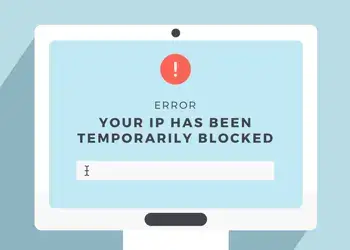Understand the “Your IP Has Been Temporarily Blocked” Error
IP addresses allow devices connected to the Internet or sharing a network to identify one another, thus allowing communication between them. Unfortunately, your IP address can sometimes become blocked on a certain network or website. Luckily, there are ways to identify why you have been blocked and how to become unblocked. In this article, learn why you may have received the "your IP has been temporarily blocked" error and what you can do about it.
Why is my IP address blocked?
Every platform or website develops its own criteria for Internet behavior that users must follow to access the site. Therefore, websites can block an IP address if a provider finds that your actions are unsafe or inappropriate in their context. In this case, you may receive a notification informing you that "your IP has been temporarily blocked." Though this error frustrates users, figuring out why the address block occurred can help users move past the situation and potentially undo the block.
If a user possesses multiple accounts under the same IP address, a website may place a temporary block on them. Some websites don't permit this as a practice. Alternatively, if you provide incorrect login information too many times, a website may temporarily ban your IP address and block access to their site.
If a notification informs you that information is not available in your area, it means that you restricted online access to your location, resulting in an IP block.

Certain corporations or universities may block IP addresses that are a threat in order to prevent their systems from hacking. A site may also block you if your IP address received a virus.
How do I unblock my IP address?
If you received a "your IP has been temporarily blocked" error from inputting your login information incorrectly too many times, you can simply wait until the ban lifts. Generally, bans of this nature do not exceed 24 hours.
If a virus has snuck into your system, the best option is to remove any malware (viruses) on your device. On Windows devices, do this by opening Windows Security and clicking on the Virus and Threat Protection tab. Selecting the Full Scan option should check for malware, fix any issues, and unblock your IP.
Using a virtual private network (VPN) or free proxy server can also solve the problem. A VPN service masks your IP address, routing it to another address viewed by the website and servers. A proxy server acts as a middleman between your device and the Internet. It anonymizes your identity so you can surf the web without third parties tracing you via your device’s IP address.
Changing your WiFi connection is another key way to unblock your address. When a device connects to a WiFi network, the network assigns it a new, unique IP address via the network router. Changing WiFi connections gives your device a new unblocked IP address.
Another way to change your IP address is to wait until your Internet service provider changes it themselves. IPv4 addresses come in two categories: local and public. While changing your local IP address will not help you unblock you address, changing your public IP address will.
Usually, the providers change your public address every couple of hours. If you cannot wait that long, try contacting the website or your provider yourself as a last resort.
How do I check if my IP address is blocked?
If you want to know if your IP address is temporarily blocked- or permanently blocked - simply use the WhatIsMyIP blacklist check to see if any blocklists added your IP address. When an IP address experiences blacklisting, it means that a certain network or server reported or banned the address.
IP blockers often blacklist IP addresses if they send out spam emails. In some cases, your IP's previous owner used it to send spam messages or hack other accounts. That results in the blocking of your IP even now. Simply type your IP address into the search bar in the blacklist lookup tool to find out if certain network or websites blocked or banned your IP.
Why do Internet service providers care about my IP address?
Internet service providers (ISPs) are often interested in how you use the resources they provide you. Likewise, website and application creators want to make sure that users utilize their resources appropriately. Therefore, some ISPs or sites monitor your online activity to gather intel on how you operate online.
Furthermore, your IP address determines your geographical location. Many online advertisers use IP addresses to provide geographically relevant advertisements to users. They can also use your IP to track how often you visit a website.
Additionally, they can see how often you perform actions. These include logins, making purchases, or sending chats on websites you visit.
Is IP blocking illegal?
Technically, no. In 2013, a U.S. District Judge in the Northern District of California ruled that it was illegal to block specific IP addresses from specific websites. However, that comes with the stipulation that no fraudulent or inappropriate behavior has occurred. If so, it was a security vulnerability, which then gave corporations the rights to ban IP addresses from websites.
If a website banned your IP for these legal reasons, then you legally cannot use a proxy server or VPN to gain further access to the website. Unfortunately, officials struggle to track violations of these laws, due to the nature of these tools masking the identity of those who access specific websites.